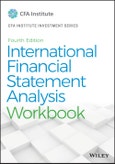Practice the concepts, tools, and techniques of international financial statement analysis
International Financial Statement Analysis Workbook gives busy professionals and those aspiring to a financial career a hands-on reference for understanding and applying the concepts and methodologies essential to accurate financial analysis. A companion to the International Financial Statement Analysis text, this practical workbook includes learning outcomes, chapter summaries, and problems that are designed to build skills and boost confidence before applying the concepts to real-world cases.
The workbook offers an opportunity to test your understanding of the standards and mechanics of financial reporting and makes use of the text’s tools and techniques. This informative guide - which has practical application across international borders - aids in the understanding of financial reporting standards, income statements, balance sheets, cash flow statements, inventories, long-lived assets, income taxes, and much more. International Financial Statement Analysis Workbook is designed to facilitate information retention and build a strong foundation in financial statement analysis.
It’s impossible to tell how well a subject is mastered without applying the relevant concepts to situations based in the real world. International Financial Statement Analysis Workbook offers the opportunity to:
• Work topic-specific practice problems to facilitate intuitive understanding
• Review each topic quickly using clear chapter summaries
• Understand each chapter’s objective to avoid missing key information
• Practice important methods and techniques before applying them in the real world
International Financial Statement Analysis Workbook, Fourth Edition provides the most up-to-date knowledge and helps to apply that knowledge with carefully constructed problems.
Table of Contents
Part I Learning Objectives, Summary Overview, and Problems 1
Chapter 1 Introduction to Financial Statement Analysis 3
Learning Outcomes 3
Summary Overview 3
Problems 5
Chapter 2 Financial Reporting Standards 9
Learning Outcomes 9
Summary Overview 9
Problems 10
Chapter 3 Understanding Income Statements 13
Learning Outcomes 13
Summary Overview 14
Problems 15
Chapter 4 Understanding Balance Sheets 21
Learning Outcomes 21
Summary Overview 21
Problems 23
Chapter 5 Understanding Cash Flow Statements 29
Learning Outcomes 29
Summary Overview 29
Problems 30
Chapter 6 Financial Analysis Techniques 37
Learning Outcomes 37
Summary Overview 37
Problems 38
Chapter 7 Inventories 45
Learning Outcomes 45
Summary Overview 45
Problems 47
Chapter 8 Long-Lived Assets 63
Learning Outcomes 63
Summary Overview 64
Problems 65
Chapter 9 Income Taxes 77
Learning Outcomes 77
Summary Overview 77
Problems 78
Chapter 10 Non-Current (Long-Term) Liabilities 83
Learning Outcomes 83
Summary Overview 83
Problems 85
Chapter 11 Financial Reporting Quality 91
Learning Outcomes 91
Summary Overview 91
Problems 93
Chapter 12 Applications of Financial Statement Analysis 97
Learning Outcomes 97
Summary Overview 97
Problems 98
Chapter 13 Intercorporate Investments 101
Learning Outcomes 101
Summary Overview 101
Problems 102
Chapter 14 Employee Compensation: Post-Employment and Share-Based 113
Learning Outcomes 113
Summary Overview 113
Problems 115
Chapter 15 Multinational Operations 125
Learning Outcomes 125
Summary Overview 125
Problems 127
Chapter 16 Analysis of Financial Institutions 139
Learning Outcomes 139
Summary Overview 139
Problems 140
Chapter 17 Evaluating Quality of Financial Reports 149
Learning Outcomes 149
Summary Overview 149
Problems 151
Chapter 18 Integration of Financial Statement Analysis Techniques 157
Learning Outcomes 157
Summary Overview 157
Problems 158
Part II Solutions 161
Chapter 1 Introduction to Financial Statement Analysis 163
Solutions 163
Chapter 2 Financial Reporting Standards 165
Solutions 165
Chapter 3 Understanding Income Statements 167
Solutions 167
Chapter 4 Understanding Balance Sheets 171
Solutions 171
Chapter 5 Understanding Cash Flow Statements 175
Solutions 175
Chapter 6 Financial Analysis Techniques 179
Solutions 179
Chapter 7 Inventories 183
Solutions 183
Chapter 8 Long-Lived Assets 191
Solutions 191
Chapter 9 Income Taxes 197
Solutions 197
Chapter 10 Non-Current (Long-Term) Liabilities 199
Solutions 199
Chapter 11 Financial Reporting Quality 207
Solutions 207
Chapter 12 Applications of Financial Statement Analysis 211
Solutions 211
Chapter 13 Intercorporate Investments 213
Solutions 213
Chapter 14 Employee Compensation: Post-Employment and Share-Based 219
Solutions 219
Chapter 15 Multinational Operations 225
Solutions 225
Chapter 16 Analysis of Financial Institutions 233
Solutions 233
Chapter 17 Evaluating Quality of Financial Reports 241
Solutions 241
Chapter 18 Integration of Financial Statement Analysis Techniques 245
Solutions 245
About the CFA Program 247








